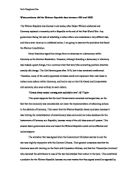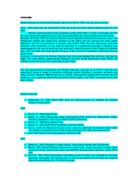Why was the Weimar Republic so unpopular with many Germans between 1919 and 1923?
After The War a new type of government was set up in Germany. This was the Weimar Republic. Between 1919 and 1923 it had to deal with many problems. 1919 saw the Spartacist Rebellion and the new government was forced to agree to the unpopular Treaty of Versailles. In 1920 the Kapp Putsch succeeded in taking over the government for a while. In 1921 Germany began to pay reparations and inflation began to get out of control. Two years later France and Belgium invaded the Ruhr and the hyperinflation was now out of control. The NSDAP, led by Adolf Hitler and General Ludendorff, tried to take over the government at this time. This bad start had three main causes.
The First reason why the Weimar Republic started badly was that there were political problems. Some people were very upset that the Kaiser had been forced to leave. This was a politically a bad start because it showed that some people would have preferred to have had the previous political system. The communists disliked the new republic because not much would change. The workers would still be poor and the rich would still be rich. They wanted the workers to have power. This contributed to the Weimar Republic’s early unpopularity because there are a group of people (the communists) who know that they will not agree with the key policies according to them. Hyperinflation made money worthless by 1923. People with savings or pensions suffered a lot. This was a politically a bad start for the Weimar Republic because the people who lost the value of their saved money, blamed the Republic for hyperinflation; they were responsible for printing more and more notes to help pay the reparations. The new government of Germany was the SPD. Many people disliked them because they only helped the workers. This was a politically a problem start for the Republic because one of the first governments it had, many people disliked, due to their policies. Some people thought that the new government had surrendered to the Allies unnecessarily. They thought that the government had stabbed Germany in the back so that they could rule instead of the Kaiser. This was politically a bad start to the Republic because it showed that a group of people distrusted the government. The Ruhr area of Germany was invaded by French and Belgian troops in 1923. This was a political problem because the government was in charge of ensuring that the reparations were paid. Some people disliked democracy. They preferred a strong leader who would decide what was best and tell them what to do. This was another politically dismal start to the Republic because it showed that there was another group that preferred the ‘Old’ Germany to the new one. Also the statement suggests that the Weimar Republic was ‘weak’ (opposite to strong) this was not the desired image of the Weimar Republic. Proportional representation created a coalition. This was a political problem for the Republic because there was hardly any chance of there ever being a strong government, due to the fact that it was extremely difficult to win a majority. The President of the Weimar Republic had potential to become a military dictator. This was a political problem for the Weimar Republic because the President could ignore the Chancellor and the Reichstag.

This is a preview of the whole essay
Teacher Reviews
Here's what a teacher thought of this essay
The author covers the key problems faced by the government well, with some good explanation in places. However, there is a great deal of repetition, suggesting that the author could have planned the response more carefully or used a different structure that they were more comfortable with. 4 out of 5 stars.







